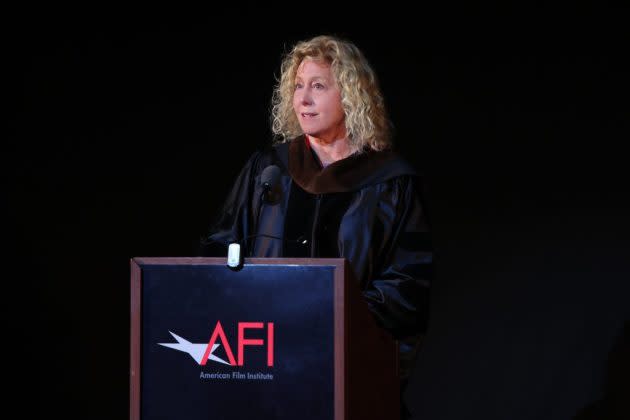AFI Dean Susan Ruskin Talks Future of Filmmaking

Since joining the American Film Institute faculty as dean and executive vice president in July 2019, Susan Ruskin has kept a steady eye on what lay next in the field of film school education. Ruskin, Variety Entertainment Educator of the Year, discusses why TV and film are more alike than different, what advances in technology means for screenwriters and why film school is still a rock solid bet when it comes to forging a career in the cinematic arts.
With so many avenues to break into the biz, why choose AFI?
More from Variety
AFI Awards: 'Nope,' 'Avatar 2' and 'The White Lotus' Among Best of 2022, Streamers Shut Out in Film
AFI Cinematography Intensive for Women Announces 2022 Participants (EXCLUSIVE)
There are many different pathways to get into the industry, but I do believe that film school offers one thing that going straight into the industry does not–and that’s a safe place to fail, and a place to meet your collaborators for life. And that is a fast track to success that you cannot get without the sort of protection of being in a space where you get the opportunity to make things and fail at making things and figure out who you are as a storyteller. One of the greatest strengths about AFI is that you come into the discipline that you want for your MFA and you have a very bespoke curriculum. And at the same time, you’re making at least three movies in your first year. We’re doing upwards of 175 productions. You get that opportunity to collaborate. And I don’t know a better way of doing it.
How accessible are the instructors to the students?
Our faculty to student ratio is pretty remarkable. And at the same time, our faculty are all working in the industry. We are higher-working professionals and discipline heads are too. From our fellow point of view, they sometimes fear that a faculty member can make or break their career. And I always tell them, nobody can make or break your career, but they definitely can help you and you can take advantage of that. I stay in touch with our students from years ago on a regular basis.
In a certain regard, TV has usurped film as a choice medium for aspiring writers, producers and directors. How has AFI met those needs?
I always tell our screenwriters, this is the one film school where you have the most access to seeing your writing go up on the screen, and for you to be involved and engaged in production. If you’re going to go into television, you better know and understand how production works, because you’re not aiming just to be in the writers room, you’re aiming to be a producer and the executive producer on a show. We have quite a bit of television classes, and it’s very much a part of the curriculum. But to me, the skill sets of being on television and in features are not dramatically different.
AFI alumni have made a giant impact in the awards race this season.
From Todd Field (“Tar”) to Diane Becker (“Nalvalny”) to Academy Award-winning “CODA” screenwriter and director Siân Heder, who was in our Directing Workshop for Women program–AFI alumni are winning. Ultimately, that shows the curriculum is working. We had Michelle Yeoh as our commencement speaker last year. I don’t even know where to begin in terms of pride other than I don’t want to get too comfortable with the expectations that AFI alumni are going to have the moment they leave.
How do you envision AFI evolving over the next five or 10 years?
Before coming here, I made it clear to the board, you’re hiring somebody that has a tendency to look ahead. And so, I’m going to be looking at what is the future of film education, because it’s not going to look the same as it looks right now. The industry has been innovating for 120 years. And the rate of disruption is exponentially faster than it’s ever been. So my feeling is how are we going to teach that next generation? How are they going to become the innovators? The beauty of AFI is that we are storytelling creatures. And stories provide meaning to everything that we do in this new digital age. How is AI going to change screenwriting? How do we teach [students] to be prepared to shift and adjust? That doesn’t mean you have to sit there and teach a class on how you shoot in front of an LED screen. It’s philosophically bigger than that. It’s about looking ahead and studying what’s coming.
Sign up for Variety’s Newsletter. For the latest news, follow us on Facebook, Twitter, and Instagram.

 Yahoo News
Yahoo News 